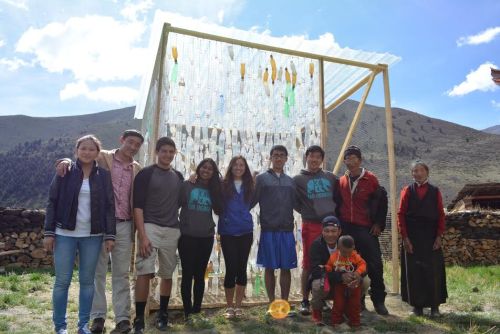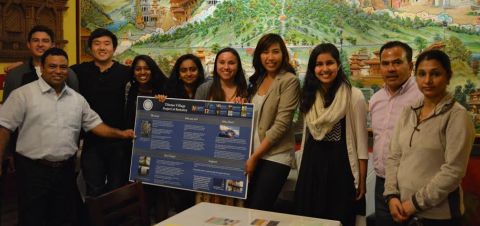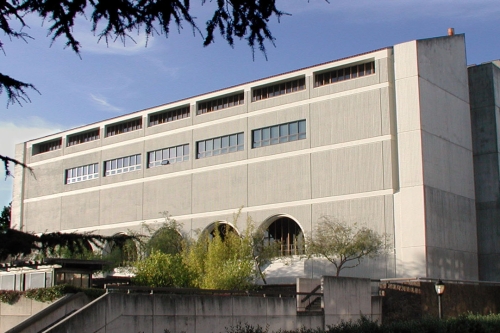Nine Berkeley students came together to tackle rural Tibet's waste management problem, a problem that poses environmental and health threats to people who once enjoyed the most pristine water in the world.
CEE majors, Joel Bai, Anthony Salguero, Alvin Wong, Lillian Fan, Anshu Maskara, and Harshita Pilla, along with Sabina Cook (microbiology), Meghana Ravikumar (bioengineering), and Athena Scott (architecture) are part of the Tibetan Village Project (TVP), a non-profit, non-political organization run solely by Tibetans. TVP promotes sustainable development and entrepreneurship while preserving Tibet’s cultural heritage.
United by their passion for environmental problem-solving, the students set about addressing as many waste management issues that they could.
"We realized Tibet's waste management problem is not only an environmental issue but an educational one," said Harshita Pilla, Project Lead.
The idea
The Berkeley team decided to build a greenhouse out of disposed plastic bottles. The greenhouse would serve as a visual reminder of what can be done with so-called "waste." Plastic bottles and glass, both recyclable, make up the bulk of the trash found in rural Tibet's rivers.

They would involve local Tibetans in the building process in the hope that the teamwork would allow them to transcend the language barrier and communicate the importance of waste management, and moreover, waste transformation.
The greenhouse's design needed to be basic. The students would need to be able to implement it themselves and the villagers would need to be able to replicate it. And it would have to be cheap.
The structure would have a concrete foundation and cross bracing to ensure that it would not be blown away or distorted by Tibet's high winds. It would have a slanted roof for easy rainwater catchment and chicken wire on all sides to hold the strings of bottles in place.
Throughout the school year, the team refined their solution and created prototypes, while also fundraising and doing publicity.

The implementation
In May, the 5 members of the Berkeley team traveled to Tibet to implement the design.
They were able to find all the necessary materials. The TVP organization and the villagers collected bottles (1500!) prior to their arrival, a critical effort since the students had very little time once they got there.
"But when does anything ever go as planned?" asks Pilla.
The team had underestimated the drastic weather near the village where they worked. By day the weather was either very hot or very windy (difficult with plastic bottles!). By night, it was really cold.
Because there was no outside lighting, the team worked with the rising and setting of the sun. The limited working hours were exacerbaed by their underestimation of the time it would take to lay the foundation.
"Pickaxing a 3 x 3 meter area and digging meter-deep holes is much more complicated than we thought," says Pilla.
Then the generator that powered the drill stopped working.
But by the end of the fourth day, they had completed the greenhouse.
The team ran out of bottles to cover the entire greenhouse. But they taught the villagers the simplicity of the job. Since returning to the US, they hear that villagers add bottles every day.
The best part
The people.
"The Tibetans were incredibly welcoming and proud to show off their amazing country. The harsh weather conditions were offset by the warmth radiating from the people, giving us even more of a reason to push ourselves and finish the project despite our setbacks," says Pilla.
TVP made sure that although the students went for the purpose of building the greenhouse, they were exposed to the culture of Tibet as well; the team ate authentic food and visited local monasteries.
"I think I can speak for my team when I say it was easily one of the most rewarding and magical experiences of our lives," says Pilla.
Bai adds, "I've never worked so hard in my life, yet I did not regret any last bit of it. Looking at the faces of the Tibetan family and our end product just warmed my heart. Looking at the dirty and labored looks on my friends' faces, I could not help but smile with them and say, 'We did it.'"
Final thoughts
The team is excited to see their project replicated. They hope that it has helped start a conversation about waste management and environmental conservation that was not there before.
"And thank you to all the people supported this initiative—with a huge shout out to the CEE Department!" said Pilla.
See TVP at Berkeley and Blog.

